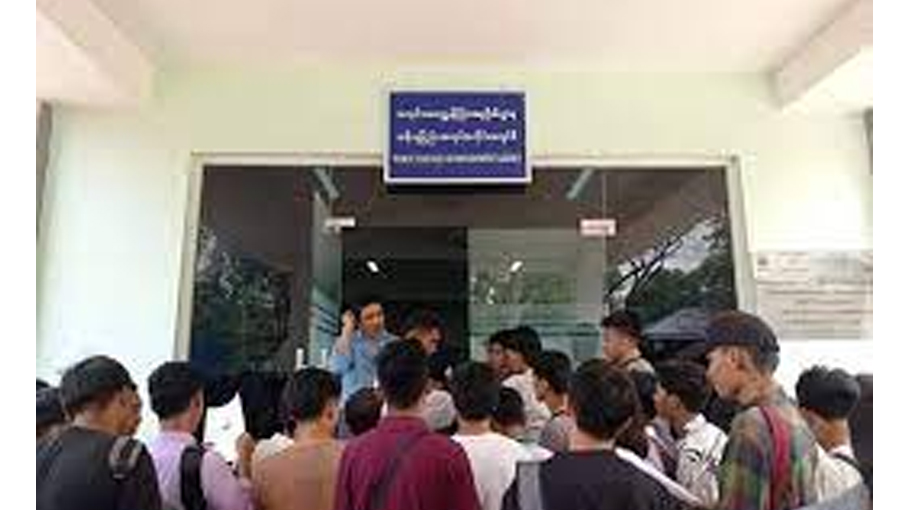Myanmar Conscription Law causing people to flee country

The junta’s implementation of the forced conscription law has caused panic among the public and has already begun to further jeopardize the human security of Myanmar’s people, sending thousands running for their lives, according to campaign group Progressive Voice.
It says that this act is the latest wave of the junta’s relentless terror campaign against the people, which has also impacted the peace and stability of Southeast Asia, especially Myanmar’s neighbors.
In response, Myanmar’s neighbors must comply with its international human rights obligations and grant legal protection to individuals fleeing the junta’s forced conscription and mass atrocity crimes. These countries must also support Myanmar’s local frontline
humanitarian responders by allowing cross-border channels for them to deliver lifesaving aid to the most vulnerable populations, including those forced to flee from conscription.
The junta’s forced conscription has undeniably ignited unprecedented fear among Myanmar’s people, particularly youth. Over recent weeks, the military junta has increased guest registration inspections, tightened road checkpoints, and imposed constraints on domestic air travel.
Meanwhile, tens of thousands are trying to flee, such as by applying for visas at overwhelmed embassies or by embarking on dangerous
journeys to other countries. In Mandalay, two women were crushed to death outside a junta passport office on 19 February 2024, as around 5,000 people had queued to apply for passports to leave the country.
In Rakhine State, this catastrophe is particularly grave. On 19 February, the junta detained around 600 passengers arriving from Yangon at Sittwe and Kyaukphyu Airports. The next day, the junta detained 100 ethnic Rakhine youth traveling by bus from Yangon to Rakhine State, holding them incommunicado in Yangon’s Hlaing Tharyar Township.
Simultaneously, the junta has arrested and forcibly recruited hundreds of Rohingya in internment camps and those remaining in Sittwe, as well as threatened and persuaded them to enlist with the potential of freedom of movement, money, rice, or national ID cards.
The Rohingya are thus being ruthlessly targeted by the perpetrators of genocide against them for conscription as human shields, human minesweepers, and porters, among other forced labor. And what’s more, with remorseless hypocrisy, the very Myanmar military conscripting the Rohingya has long deprived them of their citizenship, access to IDs and passports, and other fundamental human rights.
Because of the junta’s countrywide terror campaign, including the enforcement of the conscription law, Myanmar’s people are being forced, at unprecedented levels, to seek safety outside the country by making perilous journeys across borders, according to Progressive Voice.
However, regional governments have blatantly refused to offer any protection. Earlier this month, Bangladesh refused the UN High Commissioner for Refugees ’request to accommodate hundreds of Rohingya who fled to the border. As such, in the coming months, even more deadly sea crossings are inevitable, as the Rohingya and others desperately seeking safety have nowhere else to turn.
On the Thailand border, protection has also been refused, as Thailand’s Prime Minister warned that legal action would be taken against those entering the country “illegally.” Along these lines, since the junta’s forced conscription announcement on 10 February, Thai authorities have arrested at least 167 Myanmar people for entering Thailand without proper documentation.
Meanwhile, the junta’s Labor Ministry has foreclosed one critical route to flee by suspending recruitment drives of the Myanmar Overseas Employment Agencies Association. With few options remaining to evade conscription and save their own lives, many may be trafficked to other countries, only to live in further precarious situations, potentially facing increased extortion and rights violations.
Moreover, as articulated by Progressive Voice’s Chairperson, Khin Ohmar, to CNN, Myanmar society will suffer an exacerbated brain drain, as countless youth flee the junta’s forced conscription, thus “caus[ing] utter devastation to the country.”
Over the coming months, many individuals fleeing forced conscription will enter Myanmar’s neighboring countries, which are ill-equipped to provide shelter and sufficient aid, have notoriously pushed individuals back, and have failed to provide them protection.
With neighboring countries ’authorities on high alert, Myanmar people fleeing from the military’s violence will likely encounter violent pushbacks and arbitrary detention in violation of international law, according to Progressive Voice. This will have resounding impacts on regional peace and stability at the expense of Myanmar people’s safety and security.
Progressive Voice says that as the military junta exacerbates human suffering in Myanmar causing further impacts on regional peace and stability, neighboring countries must, without delay, provide legal protection for those fleeing from the junta’s forced conscription and ongoing mass atrocity crimes.
They must also support local, trusted frontline humanitarian responders by allowing cross-border channels for them to deliver emergency aid to displaced communities.
Alongside this regional action, the UN Security Council must fulfill its mandate to restore peace and security in both Myanmar and the region by coordinating Myanmar’s neighboring countries to expedite protection and aid for Myanmar’s people, while taking decisive action to adopt a binding resolution to hold the military – the root cause of Myanmar’s multi-faceted crisis – accountable for its decades of mass atrocity crimes.
Ultimately – Progressive voice believes that to end this cycle of violence, instability, and impunity – Myanmar’s neighbors and the wider international community must heed the steadfast calls of Myanmar’s people to dismantle the military junta and its criminal, corrupt institutions, and pursue sustainable, long-term solutions to ensure democracy, peace, and stability in Myanmar.


